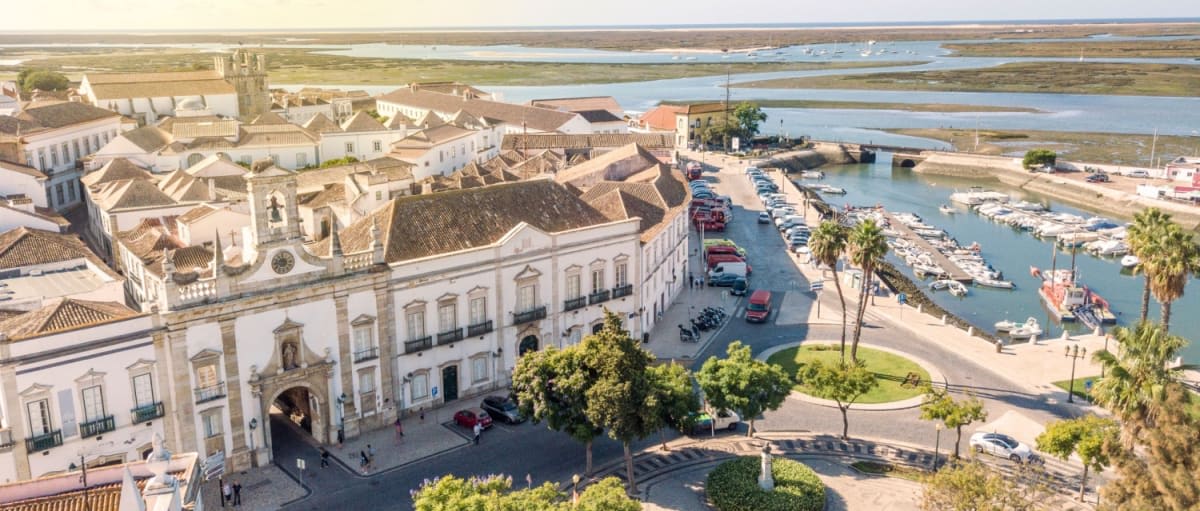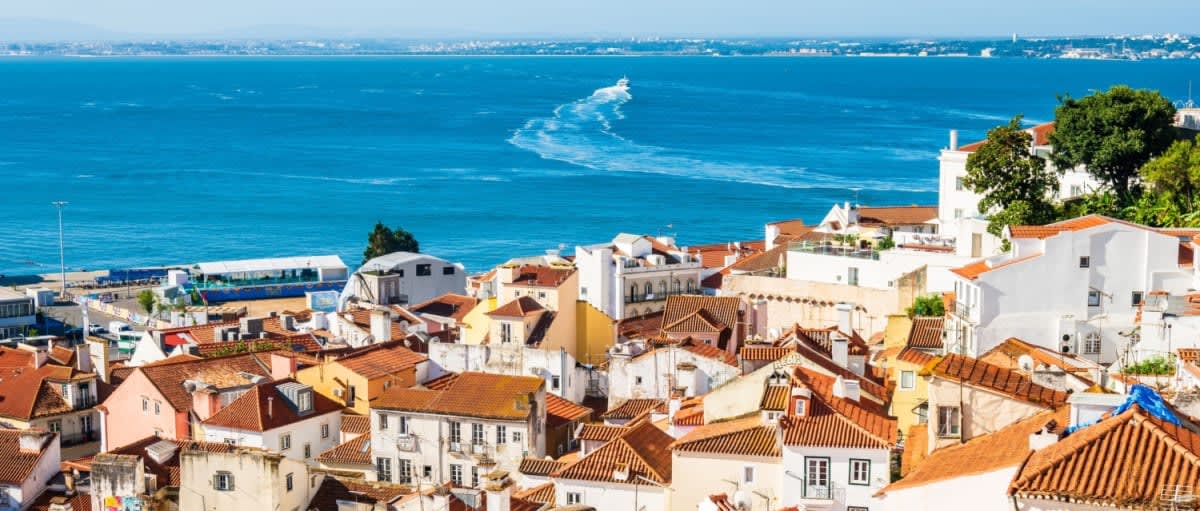It’s easy to see why retiring to Portugal is becoming an increasingly popular choice for international buyers. With its warm climate, affordable cost of living and welcoming communities, Portugal offers an exceptional quality of life for retirees seeking sunshine, culture and peace of mind.
Whether you’re dreaming of golden beaches in the Algarve, the historic charm of Tavira, or the island tranquillity of Madeira, the country caters to a wide range of preferences and lifestyles. Portugal also offers a straightforward residency process through the D7 visa, making it accessible for non-EU citizens with passive income.
From excellent healthcare options to a vibrant expat network and well-connected transport links, Portugal makes retiring abroad a rewarding and practical choice.
Let’s explore everything you need to know – from residency and healthcare to the best places to live – so you can plan your move with confidence and clarity. Portugal might just be the perfect place to begin your next chapter.
Download the Portugal Buying Guide
Contents

The appeal of Portugal for retirees
Affordable living
Living in Portugal can be remarkably cost-effective, which is one of the primary reasons it attracts so many retirees, especially those living on pensions or fixed incomes. Everyday essentials such as groceries, utilities, local transport and dining out are consistently lower than in many other Western European countries. For example, a typical meal at a mid-range restaurant can cost significantly less than what you’d pay in the UK or France, and public transport options are both reliable and budget-friendly. Property prices outside of the major cities also tend to be affordable, offering good value whether you rent or buy.
According to the Property Guides Cost of Living Overseas Index 2024, Portugal ranks third cheapest out of 12 countries surveyed, making it a standout option for those seeking financial peace of mind during retirement. Lower costs mean retirees can enjoy a comfortable lifestyle – perhaps even one that includes regular outings, cultural events, or day trips – without stretching their budgets.
Gorgeous climate
Portugal’s climate is a major draw for retirees seeking sun, warmth, and an outdoor lifestyle. The country enjoys more than 300 days of sunshine a year, with regional variation to suit all preferences. The Algarve, a particularly popular destination, features warm temperatures throughout the year, averaging 20°C to 21°C even in the cooler months. This allows retirees to maintain an active, outdoor lifestyle whether they enjoy golfing, gardening or coastal walks.
The capital, Lisbon, offers similarly mild weather, while the island of Madeira – known for its subtropical climate – provides a more temperate environment with cooler summers and very mild winters. The sea breezes make coastal towns especially pleasant, even during the height of summer.
For retirees used to grey and damp northern climates, Portugal’s weather can be transformative, contributing to both physical and mental well-being. The long days of sunshine promote an active, healthy retirement, while the mild winters reduce heating costs and weather-related discomfort.
Easy to reach
Portugal’s accessibility is a significant advantage for retirees who expect regular visits from friends and family or wish to travel themselves. The country is well-served by three major international airports – Lisbon in the centre, Porto in the north, and Faro in the south – making it easy to connect to most major cities across Europe and beyond. Budget airlines and national carriers alike operate frequent, affordable routes, including direct flights to the UK, Ireland, France, Germany and North America.
This excellent connectivity means you don’t have to feel isolated when retiring abroad. Whether it’s a family gathering, medical appointment back home or a spontaneous weekend getaway, travel is simple and often inexpensive. Internal transport options, such as the country’s modern motorway system and efficient train services, also make it easy to explore Portugal itself. In short, being based in Portugal doesn’t mean being cut off – it means being well-positioned to enjoy both your new life and your existing relationships.
A ready-made community
Relocating abroad can be a daunting step, especially later in life, but Portugal offers a soft landing thanks to its welcoming and established expatriate community. Thousands of retirees from the UK, Ireland, Germany, the Netherlands and beyond have already made the move, particularly to regions like the Algarve and Cascais. This means you’re never far from someone who understands your experience and can offer advice, friendship or simply a familiar conversation.
These communities are diverse and active, with many offering social clubs, language classes and volunteer opportunities. Whether you’re looking for a quiet village life or a lively neighbourhood with organised activities, there are many options to suit different personalities and lifestyles. Despite this influx of newcomers, Portugal retains its authenticity – locals are typically friendly and welcoming and integration is encouraged.
The result is a culturally rich and socially supportive environment that eases the transition and enhances day-to-day enjoyment of your new home.

Residency and visa options for retirees in Portugal
Portugal remains a top destination for non-EU retirees due to its welcoming visa policies and quality of life. If you’re a citizen of a non-EU/EEA country or Switzerland, you’ll need to apply for a visa to reside in Portugal. The most popular route for retirees is the D7 visa, commonly referred to as the “retirement visa.”
The D7 visa is specifically designed for those with stable passive income sources, allowing you to live in Portugal without engaging in formal employment. It’s particularly suitable for pensioners, those with annuities, dividends or rental income, and is regarded as a flexible, long-term residency solution.
Once granted, the D7 visa allows you to live in Portugal full-time, access public healthcare services, and move freely within the Schengen Area. It also lays the groundwork for permanent residency or even Portuguese citizenship further down the line. For retirees seeking stability, sun, and a slower pace of life, this visa offers an accessible legal pathway to making Portugal their new home.
Requirements
To qualify for the D7 visa, applicants must demonstrate they have sufficient passive income to support themselves without relying on employment in Portugal. This income can come from a range of sources, such as state or private pensions, investment returns, savings accounts, dividends or rental income from properties.
In 2024, the minimum annual income required for a single applicant was just under €10,000, which is based on the Portuguese minimum wage. For couples, an additional 50% is required (around €5,000), and for each dependent child, a further 30% is needed.
While the thresholds are modest compared to many other residency programs across Europe, the Portuguese authorities will expect evidence that this income is stable and sustainable over the long term. Proof of income typically includes bank statements, pension award letters and tax returns. Applicants are also advised to maintain a Portuguese bank account with sufficient funds to demonstrate financial readiness.
Meeting these requirements helps ensure that you can comfortably support yourself while living in Portugal.
How to apply
Applying for the D7 visa involves a two-stage process, beginning in your country of residence and concluding in Portugal.
The first step is preparing your application, which requires gathering several essential documents. These include proof of accommodation in Portugal (such as a rental agreement or property deeds), evidence of sufficient income, valid travel insurance, a criminal background check and a cover letter detailing your motivations for moving.
Before applying, you must also obtain a Portuguese tax identification number (NIF) and open a local bank account – both of which can usually be arranged remotely with the help of legal or relocation services.
- Step one: book an appointment with your nearest Portuguese consulate or embassy to submit the visa application. If successful, you’ll receive a four-month visa, allowing you to travel to Portugal.
- Step two: attend an in-person appointment with the Immigration and Borders Service (SEF) to apply for your residence permit. Planning ahead and seeking advice can make this process much smoother.
Validity and costs
Once issued, the initial D7 residence permit is valid for two years, providing you with the right to reside in Portugal and enjoy many benefits afforded to local residents, including healthcare and travel within the EU. After the initial two-year period, the permit can be renewed for an additional three years, giving you five years of legal residency in total. At that point, if you continue to meet the eligibility requirements, you may apply for permanent residency or even Portuguese citizenship, provided you pass a basic language test and meet other legal conditions.
To maintain the permit’s validity, you must spend a minimum of six months and one day per year in Portugal. This requirement can be fulfilled through continuous stay or multiple shorter visits that collectively meet the timeframe. In terms of cost, the visa application fee is approximately €80, payable at your local consulate, and the subsequent residence permit issued by SEF costs around €170. These fees are relatively low compared to similar visa schemes in other EU countries, making the D7 visa one of Europe’s most accessible retirement options.

Healthcare in Portugal
Portugal offers a well-regarded healthcare system that is both accessible and affordable for legal residents, including retirees.
As a resident, you’ll be eligible to use the Serviço Nacional de Saúde (SNS), Portugal’s public healthcare service. Once you’ve registered with your local health centre and contributed to the national social security system, you’ll be issued a número de utente de saúde (health user number), which grants you access to public medical services.
While the SNS is subsidised by the government, small user fees (taxas moderadoras) are typically required for GP visits, diagnostic tests, and specialist consultations. These fees are modest compared to private systems in other countries.
However, for non-EU retirees, there are important distinctions. The Global Health Insurance Card (GHIC) does not apply for full-time residents, meaning you won’t be able to rely on reciprocal agreements for public health access. This makes private health insurance essential – especially during your initial years on the D7 visa. Proof of comprehensive private coverage is often a mandatory component of the visa application and renewal process.
Fortunately, Portugal has a robust network of private healthcare providers, offering services in multiple languages and often with significantly shorter waiting times than the public system. Many retirees prefer this route, not only for convenience and efficiency, but also for access to specialist care and facilities. Monthly premiums for private health insurance are typically lower than in countries like the US, with plans tailored to age and medical needs.
This dual system – public and private – offers flexibility, allowing retirees to choose care that best suits their budget, preferences and health circumstances.
The best places to retire in Portugal
The Algarve
The Algarve remains one of the most popular retirement destinations in Portugal, offering a unique mix of natural beauty, warm weather and modern convenience. This southern coastal region boasts over 300 days of sunshine a year, making it ideal for year-round outdoor living.
Retirees are drawn to the Algarve’s excellent healthcare facilities, well-developed transport links, and welcoming international community. From vibrant beach towns to peaceful inland villages, the Algarve caters to a range of lifestyles and budgets. Its rich culinary scene, charming markets, and picturesque landscapes all contribute to a relaxed, fulfilling retirement in one of Europe’s most desirable coastal regions.
Lagos
Located on the western edge of the Algarve, Lagos blends a relaxed coastal charm with cosmopolitan flair. Its historic old town, marina and scenic cliffs provide a beautiful backdrop for everyday living. The town offers a range of property styles, from contemporary seafront apartments to traditional townhouses with Portuguese character.
Lagos is also known for its diverse population, with many English-speaking expats and welcoming locals. Its beaches – such as Praia Dona Ana and Meia Praia – are among the best in Portugal.
With a strong community feel and plenty of cultural activities, Lagos is ideal for retirees who want beauty and vibrancy.
Tavira
Tavira, situated in the eastern Algarve, offers a slower pace of life and a strong sense of tradition. This charming town is celebrated for its cobbled streets, Roman bridge, and historic churches, all set against a backdrop of tranquil riverfront views. Despite its old-world charm, Tavira offers modern amenities and well-connected infrastructure, including easy access to Spain.
Retirees are drawn to its peaceful atmosphere, affordable property market, and authentic Portuguese lifestyle. The nearby Ilha de Tavira beach and Ria Formosa Natural Park provide ample opportunities for relaxation and nature exploration, making Tavira ideal for a calm and scenic retirement.
Olhão
Olhão is an authentic fishing town that delivers a true taste of Portuguese life. Known for its bustling fish markets and historic architecture, the town retains a working character while slowly attracting a community of international retirees. It offers an excellent location near the Ria Formosa islands, with ferry access to pristine, car-free beaches.
The annual shellfish festival, waterfront promenades and proximity to Faro Airport add to its appeal. Though less polished than other Algarve destinations, Olhão’s authenticity, affordability, and tight-knit community make it an increasingly popular choice for retirees seeking cultural depth and a local way of life.

Vilamoura
Vilamoura is a modern, upscale resort town in the central Algarve that offers an active and sociable retirement lifestyle. It’s especially popular among golf enthusiasts, with several championship courses nearby. The stylish marina serves as a central hub for restaurants, boutiques, and cultural events, creating a vibrant social scene year-round.
Vilamoura’s high-quality infrastructure and safe, walkable layout make it easy to get around, while a variety of residential options – ranging from luxury apartments to detached villas – cater to differing needs.
For retirees who enjoy leisure, activity, and a strong sense of community, Vilamoura is a standout destination in southern Portugal.
Carvoeiro
Carvoeiro combines dramatic coastal scenery with a welcoming, village-like feel. Nestled among cliffs and golden beaches, it has grown from a small fishing village into a popular yet manageable resort town. The area offers a mix of traditional homes and modern developments, with many properties enjoying panoramic sea views.
Retirees are attracted by the peaceful pace of life, friendly community, and proximity to golf courses, walking trails, and health services. Carvoeiro’s compact centre makes it easy to get around on foot, while its strong expat presence means newcomers quickly feel at home. It’s a haven for relaxation and scenic living.
Cascais
Cascais, just 30 minutes west of Lisbon, is a former royal retreat that now serves as a sophisticated coastal town with a high quality of life. Retirees here enjoy a perfect balance of seaside charm and city convenience. With a mild climate, scenic promenade, and cultural attractions, Cascais offers an elegant yet accessible retirement.
Cascais’s modern healthcare facilities, international schools and extensive public transport make it practical as well as beautiful. Though property prices are higher than in rural areas, the lifestyle benefits – such as proximity to Lisbon, top-tier amenities, and a thriving social scene – make Cascais a compelling option.

Funchal, Madeira
Funchal, the capital of Madeira, is an excellent retirement choice for those who appreciate natural beauty and a gentle climate. Set against lush mountains and Atlantic waters, Funchal offers a mix of city living and island tranquillity. The town features lively markets, charming gardens and a growing number of English-speaking residents. Healthcare services are strong, with both public and private options available.
With frequent direct flights to the mainland and Europe, Funchal is well-connected despite its island location.
The slower pace, combined with low crime and a strong community atmosphere, makes Funchal ideal for a peaceful and picturesque retirement.
Aveiro
Aveiro is a charming canal city in central Portugal, often called the “Venice of Portugal” due to its colourful boats and winding waterways. While smaller than major urban centres, Aviro offers a lively cultural scene, modern amenities, and excellent transport links.
Located close to both Porto and Coimbra, Aveiro provides easy access to larger cities while maintaining a peaceful, small-town feel. The cost of living is lower than in Lisbon or Cascais, and the nearby beaches attract those who enjoy nature and seaside activities.
For retirees seeking affordability, beauty, and strong infrastructure, Aveiro presents a unique and appealing option.
Make sure you claim your free copy of our moving to Portugal Buying Guide:
Download the Portugal Buying Guide
For those considering retirement abroad, Portugal stands out as an excellent option with a welcoming community, affordable lifestyle, and diverse landscapes. Whether you find your perfect home in the Algarve or prefer the charm of a small town, Portugal’s inviting culture and opportunities for a fulfilling retirement are abundantly clear.
If you’re preparing to retire abroad, it’s worth learning how to buy property in Portugal to help your move go smoothly – from understanding the legal process to managing your finances. You can also explore where to buy property in Portugal for inspiration on towns and regions that suit a relaxed, retirement lifestyle.
Frequently asked questions about retiring to Portugal
Yes, Portugal is one of Europe’s most popular retirement destinations thanks to its mild climate, affordable cost of living, welcoming communities, and excellent healthcare.
Most non-EU retirees apply for the D7 visa, which is designed for those with passive income such as pensions or investments. It allows you to live in Portugal full-time and access healthcare services.
The minimum income requirement is based on the Portuguese minimum wage – around €10,000 per year for a single applicant, with higher thresholds for couples and dependents.
Public healthcare is subsidised and accessible to legal residents, though most non-EU retirees start with private insurance. Once registered, you can use both public and private options.
Top retirement locations include the Algarve (Lagos, Tavira, Vilamoura), Cascais, and Madeira. Each offers a mix of lifestyle benefits, healthcare access, and active expat communities.









